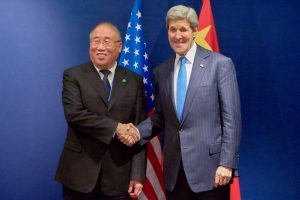U.S. climate envoy John Kerry is heading to China for talks between the world’s two biggest carbon emitters ahead of President Joe Biden’s climate summit of world leaders.
Kerry will travel to Shanghai and Seoul, from April 14 to 17, the State Department said in a statement the day before his departure. The news was also announced by China’s Ministry of Ecology and Environment.
The former secretary of state will talk with China’s top climate negotiator, fellow veteran diplomat Xie Zhenhua, China’s Foreign Ministry confirmed on April 14. “The two will have exchanges on China-US climate cooperation and COP26 of the UNFCCC,” Chinese Foreign Ministry spokesperson Zhao Lijian told the press.
Kerry and Xie have a long history on climate issues, having worked together while Kerry was secretary of state under former President Barack Obama. The two men were pivotal in forging a China-U.S. agreement on climate change in 2014, which in turn paved the way for a meaningful global deal at the Paris climate conference the next year. Xie came out of semi-retirement earlier this year to once again become China’s top climate negotiator, a move seen as aimed specifically at giving Kerry a veteran interlocutor in the Chinese government.
Kerry’s trip to Shanghai marks the highest-level travel to China known so far for officials of the Biden administration. That cements perceptions that climate change is one of the few issues where China and the United States can find common ground – and even that might be difficult.
Chinese Foreign Ministry spokesperson Zhao Lijian, speaking just over a week after Biden’s inauguration, previously suggested that U.S.-China cooperation on climate issues would be impacted by disagreements in other areas. “I’d like to stress that China-U.S. cooperation in specific areas, unlike flowers that can bloom in a greenhouse despite winter chill, is closely linked with bilateral relations as a whole,” Zhao said in a press conference on January 28, responding specifically to a question about Kerry’s bid for climate change cooperation. “China has emphasized time and again that no one should imagine they could ask China to understand and support them in bilateral and global affairs when they blatantly interfere in China’s domestic affairs and undermine China’s interests.”
The governments of Chinese President Xi Jinping and President Joe Biden are sparring over trade, human rights within China, and China’s increasingly assertive actions in the larger Indo-Pacific, among other points of tension. As an example of the challenges involved, Kerry’s visit will overlap with an unofficial U.S. delegation’s trip to Taiwan, the first such exchange under the Biden administration. In response, Zhao issued the usual warnings against Taiwan-U.S. interactions “to avoid further grave damage to China-U.S. relations.”
There is much at stake as Kerry and Xie try to find ways to cooperate. China is the largest contributor by far of climate-damaging fumes from burning petroleum and coal. The United States is the second largest emitter – and the leader by a factor of two-to-one when taking historical emissions into account. That makes cooperation between the two powers essential to any success of global climate accords.
Biden has invited 40 world leaders, including Xi, to participate in an April 22-23 virtual climate summit. The United States and other countries are expected to announce more ambitious national targets for cutting carbon emissions ahead of or at the meeting, along with pledging financial help for climate efforts by less wealthy nations. Kerry has been pressing global leaders in person and over the internet ahead of the summit for commitments and alliances on climate efforts.
China has yet to confirm whether Xi will attend the virtual summit. Zhao, the Foreign Ministry spokesperson, declined to comment when asked about Xi’s participation.

































